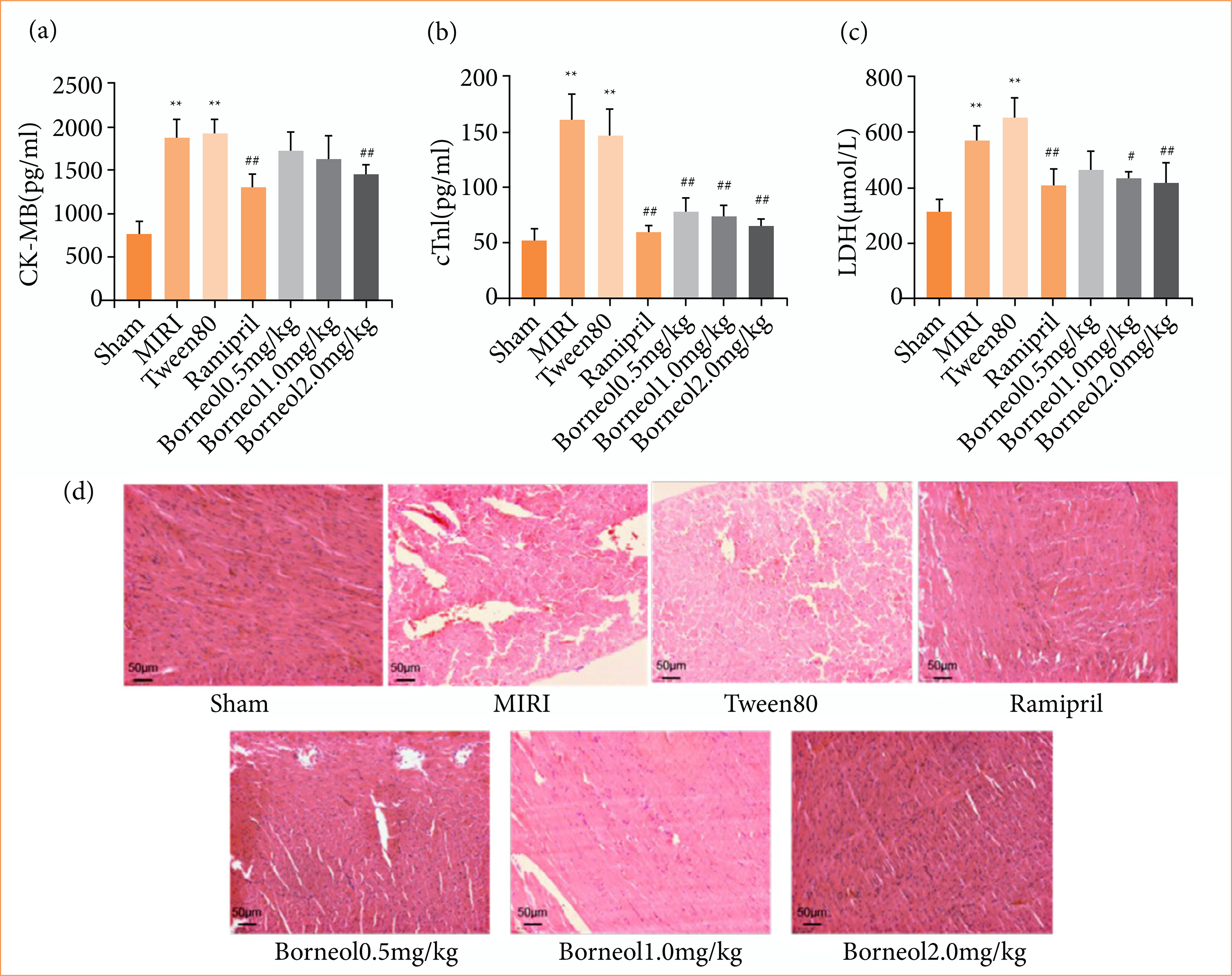ABSTRACT
Purpose: To explore the protective effects of borneol in myocardial ischemia-reperfusion injury (MIRI) and the mechanism of apoptosis.
Methods: Cell viability was detected by CCK-8. The total superoxide dismutase (T-SOD) and lactate dehydrogenase (LDH) leakage of cells were tested by biochemical assay kit. Detection of apoptosis was by flow cytometry. Serum levels of creatine kinase isoenzyme MB (CK-MB), LDH, and cardiac troponin I (cTnI) were detected by enzyme-linked immunosorbent assay. Myocardial infarction area and pathological changes were observed via 2,3,5-triphenyltetrazolium chloride (TTC) staining and hematoxylin and eosin staining. The expressions of apoptosis-related proteins in cells and myocardial tissues were detected by Western blot.
Results: H9c2 cell viability was significantly increased by pretreatment with 16 and 32 μg/mL of borneol. Borneol pretreatment significantly increased the T-SOD levels and reduced LDH leakage and apoptosis. In MIRI rats, borneol pretreatment significantly reduced serum levels of CK-MB, LDH and cTnI, decreased myocardial infarction area, and improved myocardial injury in different degree. Western blot results showed that borneol pretreatment significantly reduced the expression of Bcl-2-associated X protein (Bax) and Cysteine-aspartate protease-3 (Caspase-3) in cells and myocardial tissues of rats.
Conclusion: Borneol can protect myocardial injury cells and mitigate MIRI by inhibiting cardiomyocyte apoptosis.
Key words
Reperfusion Injury; Myocardial Infarction; Apoptosis

 Effects of borneol on apoptosis of hypoxia/reoxygenation H9c2 cells and myocardial ischemia-reperfusion injury rats
Effects of borneol on apoptosis of hypoxia/reoxygenation H9c2 cells and myocardial ischemia-reperfusion injury rats Thumbnail
Thumbnail
 Thumbnail
Thumbnail
 Thumbnail
Thumbnail
 Thumbnail
Thumbnail
 **p < 0.01 vs. control group; ##p < 0.01 vs. H/R group. Source: Elaborated by the authors.
**p < 0.01 vs. control group; ##p < 0.01 vs. H/R group. Source: Elaborated by the authors.
 *p < 0.05; **p < 0.01 vs. control group; #p < 0.05; ##p < 0.01 vs. H/R group. Source: Elaborated by the authors.
*p < 0.05; **p < 0.01 vs. control group; #p < 0.05; ##p < 0.01 vs. H/R group. Source: Elaborated by the authors.
 **p < 0.01 vs. sham group; #p < 0.05 vs. Tween80 group; ##p < 0.01 vs. Tween80 group; MIRI: myocardial ischemia-reperfusion injury. Source: Elaborated by the authors.
**p < 0.01 vs. sham group; #p < 0.05 vs. Tween80 group; ##p < 0.01 vs. Tween80 group; MIRI: myocardial ischemia-reperfusion injury. Source: Elaborated by the authors.
 **p < 0.01 vs. sham group; #p < 0.05 vs. Tween80 group; ##p < 0.01 vs. Tween80 group; MIRI: myocardial ischemia-reperfusion injury. Source: Elaborated by the authors.
**p < 0.01 vs. sham group; #p < 0.05 vs. Tween80 group; ##p < 0.01 vs. Tween80 group; MIRI: myocardial ischemia-reperfusion injury. Source: Elaborated by the authors.